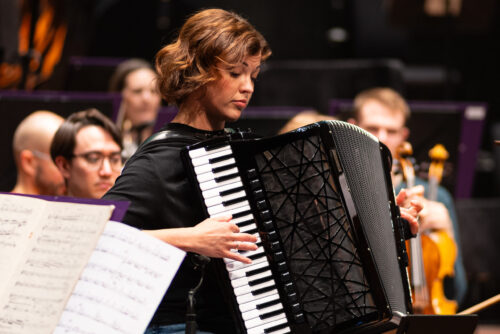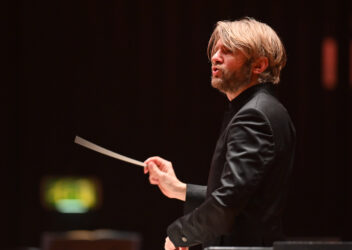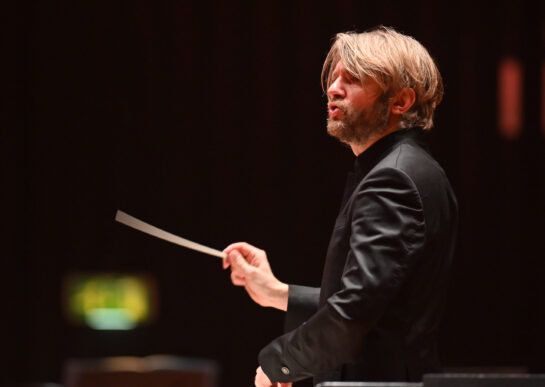 United Kingdom Mozart, Trojan, de Hartmann, Tchaikovsky – Fairytales and Folklore: Ksenija Sidorova (accordion), Bournemouth Symphony Orchestra / Kirill Karabits (conductor). Lighthouse, Poole, 26.3.2025. (CK)
United Kingdom Mozart, Trojan, de Hartmann, Tchaikovsky – Fairytales and Folklore: Ksenija Sidorova (accordion), Bournemouth Symphony Orchestra / Kirill Karabits (conductor). Lighthouse, Poole, 26.3.2025. (CK)

Mozart – Overture, The Magic Flute
Václav Trojan – Fairy Tales, a Concerto for Accordion
Thomas de Hartmann – Fairy Tales
Tchaikovsky – Francesca da Rimini
There was the warmest of welcomes for Kirill Karabits on his first return to the Lighthouse, Poole since the end of his 15 years as Chief Conductor of the Bournemouth Symphony Orchestra. He brought with him a colourful and spellbinding programme: heartening evidence that his pioneering Voices from the East series – such a distinctive element of his Bournemouth years – continues.
Mozart’s Overture to The Magic Flute proved an ideal curtain-raiser to a concert entitled Fairytales and Folklore. The orchestra was very much on its toes, from the solemn opening wind chords to the precision and brilliance of the fugal writing for strings: we were well and truly ushered into Mozart’s ‘mythical land between the sun and the moon’.
Off went all the brass apart from a solitary trumpet, and on came five percussionists, a pianist and a celeste player (it was good to see Samantha Carrasco, well known in Hampshire as a member of the Mayflower Ensemble, at the piano). On, too, came the Latvian accordion virtuoso Ksenija Sidorova, one of the most magnetic soloists you will ever see (for me she is up there with Emilia Amper, the Swedish nyckelharpa player). And we were treated to Václav Trojan’s Fairy Tales, a Concerto for Accordion.
I cannot do better than quote Andrew Burn: ‘Fairy Tales is redolent with music that is deftly scored, laced with good humour, overflowing with fresh melodic invention and with a flair for drama and characterisation. All in all, it is just hugely enjoyable fun.’ To reproduce my notes on the work’s seven sections – with titles like The Bleary-Eyed Princess, The Rollicking Roundabout and The Tale of the Acrobat – would do the music no service at all. From the bright, Petrushka-like opening to the final gallop it was impossible to detach our eyes and ears from the soloist and the sounds she was conjuring from her impressive squeezebox: and the orchestra was with her all the way.
As a substantial encore she formed a combo with the front-desk string players – ‘a little surprise for you’ – and performed a Piazzolla-inspired piece with a charming story behind it, her sultry and capricious playing evoking its atmosphere powerfully and pungently. She is a natural communicator; she would go down a storm at the BBC Proms.
At their never-to-be-forgotten Voices from the East festival in the Royal Festival Hall last May – three concerts in one day – Karabits and the BSO played Ukrainian composer Thomas de Hartmann’s attractive – and by no means lightweight – Suite from La Fleurette Rouge; it was a pleasure to return to his music in a piece that shared its title, Fairy Tales, with Trojan’s Accordion Concerto. As with the Trojan piece, it is in short sections – twelve of them this time – with titles (it was good of Andrew Burn, in his programme note, to give us these titles in full: they aid our understanding of the character as well as the content of each tale. Sample: The Little Peasant as Big as a Thumb with Moustaches Seven Miles Long). We also get The Witch’s House on Hen’s Legs, Baba Yaga the Witch and Kasstchei the Deathless, indicating some overlap with Mussorgsky’s Pictures and Stravinsky’s Firebird.
Again, I am loth to inflict my notes on the hapless reader, except perhaps the postscript: ‘This is lovely music. Why don’t we hear it more often?’ I found myself thinking of Vaughan Williams from time to time: due, no doubt, to the folklike nature of much of the material, the modal flavour of some of the string writing, the music’s affecting candour and glow. There were moments when we seemed to be walking a Ukrainian equivalent of Wenlock Edge. Not to make too much of this: I suppose I am saying that the music moved me in the same way that Vaughan Williams’s does. There was music of gossamer beauty, radiance and great splendour before the quiet closing benediction.

This remarkable concert ended with a fiery performance of Tchaikovsky’s Francesca da Rimini: Karabits gave it his all, and the orchestra played out of its collective skin. Infernal flames from the violins, flickering woodwind, baleful brass – and doesn’t Tchaikovsky keep his players busy in the outer sections! A plaintive clarinet, passion and emotion from the strings, intensity from everyone in the central love scene before Karabits whipped up the final stretch to an even greater height. He and the orchestra applauded each other vigorously, and when he turned to us he was cheered to the rafters.
Somewhere above our heads, I imagine, was the approving shade of Leopold Stokowski; he apparently conducted – and narrated – the first performances of de Hartmann’s Fairy Tales at three children’s concerts in Houston; and his recording of Francesca da Rimini has long possessed legendary status.
In my last review of a Lighthouse concert I omitted to mention that the BSO’s charismatic Chief Executive Dougie Scarfe came on to pay inspiring tribute to Edward Kay, Principal Oboe, who was retiring from the orchestra after 37 years. He was onstage again at this concert to do the same for Tim Fisher, first violin, retiring after more than 38 years. He also informed us that, for the first time, this BSO concert was being live-streamed to both Chambers of the Houses of Parliament. I hope that a good number of Right Honourable Members and Noble Lords and Ladies were able to enjoy this unusual and thrilling evening of music-making.
Chris Kettle
